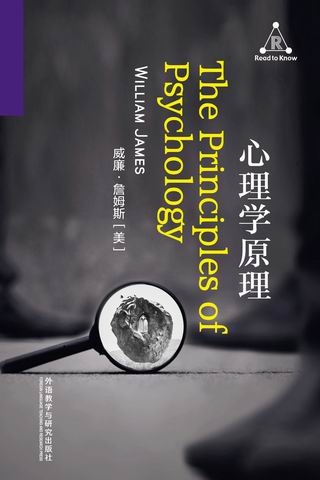詹姆斯编著的《心理学原理》是西方重要的哲学、心理学经典文献之一,在哲学和心理学等领域产生了广泛的影响。詹姆士从将心理学当作一门自然科学的基本前提出发,研究了心理活动与大脑神经生理活动的关系,考察了关于人的心理现象的内省分析和实验研究等方法,对意识、记忆、想象、情绪、推理等各种心理现象进行了细致的讨论,特别是提出了思想之流(或意识流)的思想,在哲学史和心理学史上占据着独特的地位。
The treatise which follows has in the main grown up in connection with the author's class-room instruction in Psychology, although it is true that some of the chapters are more 'metaphysical,' and others fuller of detail, than is suitable for students who are going over the subject for the first time. The consequence of this is that, in spite of the exclusion of the important subjects of pleasure and pain, and moral and aesthetic feelings and judgments, the work has grown to a length which no one can regret more than the writer himself. The man must indeed be sanguine who, in this crowded age, can hope to have many readers for fourteen hundred continuous pages from his pen. But wer Vieles bringt wird Manchem etwas bringen; and, by judiciously skipping according to their several needs, I am sure that many sorts of readers, even those who are just beginning the study of the subject, will find my book of use.
詹姆斯写完这部著作后声称,关于心理学他已没有什么可说的了,便转而从事哲学的研究和著述。1892年,他把这部巨著改写为一本教科书,书名是《心理学简编》,在美国曾多年被用为教本,上海商务印书馆1933年出版伍况甫所译的中译本《心理学原理》一书的基本内容为:第1卷前6章讲生物学的基本知识、身心关系。其余部分讨论心理学的研究对象和方法。第2卷讲感觉、知觉、信仰、推理、本能和意志。最后两章讨论催眼和心理发生学,类似两篇附录。
There are four methods from James' book: stream of consciousness (James' most famous psychological metaphor); emotion (later known as the James–Lange theory); habit (human habits are constantly formed to achieve certain results); and will (through James' personal experiences in life)
- Preface
- Chapter 1. The Scope of Psychology
- Chapter 2. The Functions of the Brain
- Chapter 3. On Some General Conditions of Brain—Activity.
- Chapter 4. Habit
- Chapter 5. The Automaton—Theory
- Chapter 6. The Mind—Stuff Theory
- Chapter 7. The Methods and Snares of Psychology
- Chapter 8. The Relations Of Minds To Other Things.
- Chapter 9. The Stream of Thought.
- Chapter 10. The Consciousness of Self.
- Chapter 11. Attention
- Chapter 12. Conception
- Chapter 13. Discrimination and Comparison
- Chapter 14. Association
- Chapter 15. The Perception of Time
- Chapter 16. Memory
- Chapter 17. Sensation
- Chapter 18. Imagination
- Chapter 19. The Perception of 'Things'
- Chapter 20. The Perception of Space
- Chapter 21. The Perception of Reality
- Chapter 22. "Reasoning"
- Chapter 23. The Production of Movement
- Chapter 24. Instinct
- Chapter 25. The Emotions
- Chapter 26. Will
- Chapter 27. Hypnotism
- Chapter 28. Necessary Truths and the Effects of Experience
- 书评 写书评
- 笔记
-
书评加载中...




















 京公网安备 11010802032529号
京公网安备 11010802032529号
笔记加载中...